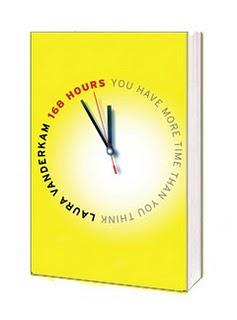
Laura’s newest book, 168 Hours: You Have More Time Than You Think, was released in May of 2010. Her book received promotion from Redbook (June 2010), and Parenting Magazine (July 2010). In addition, Laura has appeared on The Today Show and Fox News.
We are thrilled to welcome Laura to Writers in Business!
First, can you tell us why we should think of our time as 168 hours?
It's what you get when you multiply 24 by 7 -- there are 168 hours in a week!Thinking in terms of 168 hours gives us a more complete picture of our time. In any given day, we might not achieve the right balance. We might have to work late, or we might be late to work because the kids miss the bus. When we get caught up in looking at 24-hour blocks, we don't see spaces in our schedules. But looking at the whole 168 hours opens up a lot more possibilities. So you can't exercise every day. But if you can get up early twice during the workweek to run for 30 minutes, and then run twice on weekends, you can make real progress.

Why do you say people have more time than we think?
Some of this is just math. There are 168 hours in a week. If you work 40 and sleep 8 hours a night (56 per week) this leaves 72 hours for other things. If you work 50, this leaves 62. This is still a lot of time! In 62 hours, you can probably find 4 to exercise, 3 to volunteer, and still have time for your family and your hobbies.
That’s a good point! I’ve never looked at time that way before. Any tips to help readers get started?
Try keeping a time log. If you've ever tried to lose weight, you know that nutritionists tell you to write down what you're eating, to keep you accountable. It's the same with time. Write down what you're doing as often as you remember (you can download a spreadsheet at Time Management Spreadsheet). Think of yourself like a lawyer billing your time to different projects. At the end of the week, add it up and see if it reflects you're priorities. If not, ask what you'd like to be doing with your 168 hours, and see what you can change.
In this demanding 24/7 world, we can all use some extra time. Laura offers a treasure trove of useful information on her blog: My 168 Hours and you can order her book on Amazon, Barnes & Noble, Borders and many other bookstores.

